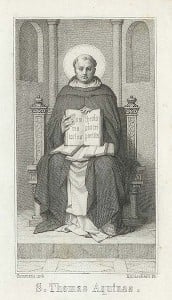 We’re blogging through St. Thomas Aquinas’ Compendium Theologiae, sometimes called his Shorter Summa. Find the previous posts here.
We’re blogging through St. Thomas Aquinas’ Compendium Theologiae, sometimes called his Shorter Summa. Find the previous posts here.
Next, Thomas shows that God must be identical to His intellect. This is a difficult point; it almost seems obviously wrong. God also has will, and love; if He is simply His intellect, how does that leave room for the rest of Him?
The problem here is that our mental model of most things is the machine. If you think of a car, you know that it has brakes and pistons and a carburetor and a gas pedal and so forth. More than that, you know that it can be taken to pieces and re-assembled. The car is separable into parts both analytically (that is, in concept) and in actuality. Now, consider a dog. A dog has parts as well, paws and legs and ears and head and tail and body; but they aren’t separable in the way the parts of a car are separable. If you remove a dog’s ears and tail, you still have a dog; but (after a very short time) you no longer have ears and a tail—not a living dog’s ears and tail. You’ve just got what used to be ears and a tail, and even Dr. Frankenstein couldn’t successfully reattach them.
On top of this, a dog is a composite of body and (animal) soul; which is to say that it is alive and grows and takes in nourishment (which it finds for itself). But the dog’s body and soul aren’t even separable in the matter of a dog and his tail. The dog’s soul (anima or psyche in Aristotelian terms) is that which makes it a living dog. If you actually separate the dog’s body from the dog’s soul, you no longer have either. Instead, you have a lump of dead matter that used to be a dog. You can separate them conceptually and analytically, but not actually, not if you love your dog and want to keep it. Still, it’s proper to say that a dog is composed of a body and an animal soul.
And then we have God, who is metaphysically simple, in Whom there is no composition. God doesn’t have parts even in this analytical sense, not really. It’s just that as Thomas showed in Chapter 25, we can’t understand Him all at once; we can only understand Him a little a time, in our finite and limited away. And then, as Thomas showed in Chapter 27, even the terms we use when speaking of Him are not quite right; we approach Him as best we can using notions we’ve gotten from the things He has created.
It is in this sense that God must be His own intelligence: He has intellect, as Thomas has shown, but is radically simple: there is only the one God, without actual part, and so what we understand as His intellect is simply Himself.
I’d have thought that a sufficient statement, but Thomas goes deeper into it:
God must be His own intelligence. Since “to understand” is second act, for example, to consider, whereas the corresponding first act is the intellect or knowledge, any intellect that is not its own understanding is related to its understanding as potency to act. For in the order of potencies and acts, what is first is always potential with respect to what follows, and what is last is perfective.
“First act” and “second act” are technical terms; you might say that “first act” is the actual possession of a power, and “second act” is the actual use of that power. I actually have eyes, and so have the power of sight (first act); and at the moment I am using that power to look at these words on my computer screen. “First act” is thereby what Thomas calls an “active potency”, and “second act” is the actualization of that potency.
Similarly with intellect and understanding. A human being can understand (first act) and then understands (second act) as the actualization of that power. The second act perfects the first.
Thomas has to qualify this, but you can move right along:
This is true only with reference to one and the same being, for among different beings the converse obtains; thus a mover and an agent are related to the thing moved and actuated as act to potency.
But God is pure act with no potency; He not only can understand, He is eternally understanding.
In God, however, who is pure act, there is nothing that is related to anything else as potency to act. Accordingly God must be His own intelligence.
For us, there is what we are at rest, and what we are when we are acting. But for God, who is always acting, these are the same: He always is what He is at rest; and what He is at rest is simply Himself. Thus, since He is always understanding, His understanding is the same as His capability to understand is the same as Himself.
Thomas then goes on to affirm God’s essential unity:
Furthermore, the intellect is related to its act of understanding as essence is related to existence. But God understands through His essence, and His essence is His existence. Therefore His intellect is His act of understanding. And thus no composition is attributed to Him by the fact that He understands, since in Him intellect and understanding and intelligible species are not distinct; and these in turn are nothing else than His essence.
photo credit: Public Domain; source Wikimedia Commons









